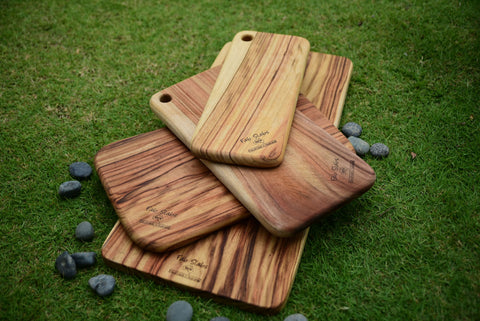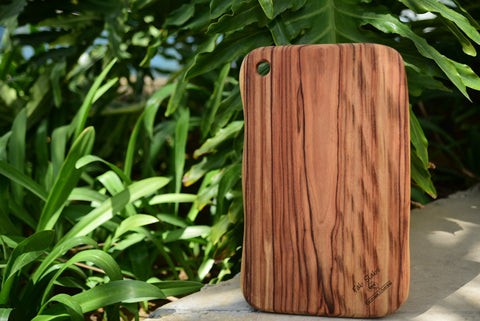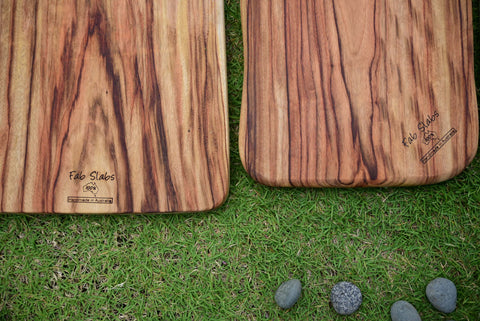Why Are Wooden Cutting Boards Better Than Plastic? (Here’s The Science)
With more focus placed on healthy eating, it only makes sense to pay attention to what kitchen tools we use while cooking. When it comes to food preparation, many home cooks have a preference for either wooden or plastic cutting boards. But what is the best option? The answer may surprise you, as there are compelling scientific reasons that wooden cutting boards are better than their plastic counterparts.

Photo by Samantha Fields on Unsplash
Wooden cutting boards have long been favored in the culinary world due to their durability, ease of cleaning, and resistance to bacteria. From a scientific perspective, wooden boards are preferable to plastic cutting boards due to their intricate indentations. These microscopic crevices reduce the risk of cross-contamination and actively destroy any bacteria that attempt to hide in the wood’s depths, especially when wooden boards become damaged by knives over time. This is because wood is naturally antimicrobial due to certain substances present within the fibers, such as tannic acid, which hinder microbial growth. Finally, wooden cutting boards can last much longer than plastic options when properly cared for and periodically exposed to heat or sunshine.
This article will discuss why wooden cutting boards should be your go-to choice in the kitchen, from limiting bacterial growth and absorption of odors to cost and environmental friendliness. We’ll also provide insight into how to properly maintain a wooden board so it can last you years and continue providing excellent service in your culinary endeavors!
- Is there any advantage of a wooden cutting board over a plastic one?
Though traditional and commonly found in home kitchens, wooden cutting boards have been dethroned by their plastic counterparts as the cutting board of choice. Yet if one takes a deeper look at wooden cutting boards, one will find that their values go beyond nostalgia. They have several advantages over plastic cutting boards, such as being gentler on knives which helps prolong the life of kitchen cutlery.
While some may be concerned about safety, as wooden cutting boards can harbor bacteria longer than plastics, it’s worth mentioning that these issues can be managed with proper cleaning and sanitizing practices. Also, recent studies have shown that most woods have natural antimicrobial properties, making them a hygienic choice.
In addition, regular oiling can help keep your wooden board functioning for years – making it a more economical board compared to plastic’s short lifespan.

Photo by Samantha Fields on Unsplash
Wooden cutting boards might need meticulous cleaning and maintenance. However, their rustic charm alone is enough to make any home chef proud!
- What Are the Pros of a Wood Cutting Board?
Wood cutting boards are not only beautiful accompaniments to any kitchen but also come with a host of benefits. Unlike plastic or glass cutting boards, wood doesn’t dull knives as quickly and is more self-healing in that minor scratches on its surface can be buffed away.
Wood is more sustainable and eco-friendly than other surfaces and naturally resists the growth of bacteria by drying fast and thus eliminating the bacteria, making for a healthier kitchen experience.
Also, the dense composition of hardwoods like teak and walnut eliminates deep cuts, which can mar your chopping board, and allows for easy storage due to its lightweight materiality.
A wood cutting board is also an attractive addition to any kitchen as they can range from rustic hewn styles to sleek modern designs. All this adds up to make a wood cutting board an ideal accent for your culinary adventures.
- What Are the Cons of a Wood Cutting Board?
For centuries, wood cutting boards have been the go-to tool for cooks when it’s time to chop, dice, and mince. Still, as with any kitchen tool, there are some cons to consider before using a wooden cutting board in your own kitchen.

While they may appeal to a traditional aesthetic, wooden cutting boards can be easy to warp or crack over time due to their vulnerability to water damage. In addition, the rough surfaces of the wood can make it difficult to clean, and its upkeep can be demanding.
- What Are the Pros of a Plastic Cutting Board?
A plastic cutting board is a great kitchen accessory, offering many advantages over traditional boards. Plastic boards are lightweight and easy to clean, making them an excellent choice for busy chefs on the go. Plus, they’re available in a variety of colors and sizes, so you can find the perfect fit for your kitchen.
Home cooks are increasingly choosing plastic cutting boards over wooden ones due to their portability, dishwasher compatibility, and affordability. Lightweight and taking up minimal storage space compared to wood, these plastic utensils represent a great value for the kitchen.
In conclusion, plastic cutting boards provide an array of benefits that make them a must-have tool in every home cook’s kitchen.
- What Are the Cons of a Plastic Cutting Board?
Plastic might seem like a great choice when it comes to cutting boards. It’s cheap and easy to clean, and you can find them in almost any size or shape. But here’s the bad news: plastic boards are not as hygienic as other choices, and you’ll have to replace them much more frequently. In addition, if you are a serious cook, you may want to avoid plastic since its thin surface easily gets scratched and nicked, which can harbor bacteria. Plus, a single misuse of a sharp knife can totally ruin your board! With so many downsides, why not opt for something safer and longer-lasting? Wooden boards might initially cost more, but they’re much better investments in the long run and definitely worth looking into.
Overall, wooden cutting boards are much preferable to plastic when it comes to hygiene and upkeep. Not only is the wood easier to keep clean, but it also neutralizes odor-causing bacteria and is less prone to warping and staining. As a result, it’s a sensible addition to any kitchen that emphasizes both practicality and healthiness. Furthermore, while they can require some extra maintenance, wooden cutting boards also have an undeniable beauty that adds a touch of elegance to every home chef’s collection of cookware. So if you’re looking for a way to add warmth plus usefulness in the kitchen, don’t overlook the classic appeal of the humble wooden cutting board!

